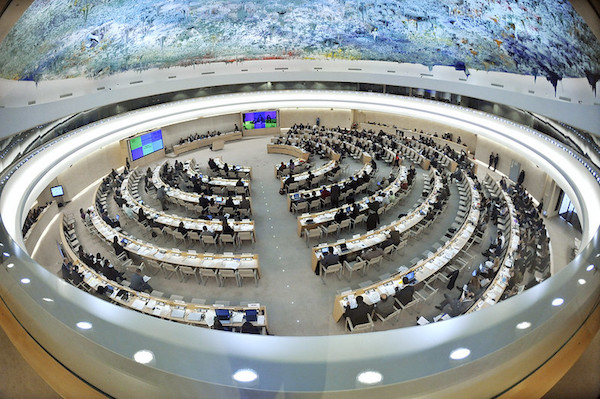The United Nations Human Rights Council approved a controversial resolution on Wednesday that urges member states to prosecute acts of religious-based antagonism more aggressively.
The motion passed despite the opposition of United States and European delegations.
The measure, backed by the Organisation of Islamic Cooperation and passed by a 28-12 vote, calls upon member states to “examine their national laws, policies, and law enforcement frameworks” to identify and rectify “gaps that may impede the prevention and prosecution of acts and advocacy of religious hatred”.
The document referenced the recent incident of the burning of pages from the Quran outside a mosque in Stockholm last month. The resolution called for the perpetrators to be “[held] to account” in accord with “international human rights law”.
The US was joined by the UK, Germany, France and several other Western nations in opposition to the measure.
Mgr David Putzer, chargé d’affaires of the Holy See’s permanent mission to the UN in Geneva, spoke at the session to condemn attacks on religious texts and symbols as an abuse of “the precious gift of freedom of expression” which “fuel hatred, intolerance and create greater polarisation”.
He said that “wilfully to insult religious beliefs, traditions or sacred objects constitutes an attack on the human dignity of the believer”.
Following the vote the US envoy Michèle Taylor said that she was “heartbroken” that the council “was unable to speak with a unanimous voice today in condemning what we all agree are deplorable acts of anti-Muslim hatred, while also respecting freedom of expression”.
“We strongly believe that hatred withers in the face of public scrutiny,” Taylor said, “and that limiting freedom of expression will only force hateful ideas to find new venues in which to manifest and call undue attention to acts that we would not wish to amplify.”
The resolution argued that “the exercise of the right to freedom of expression carries with it special duties and responsibilities”, and that freedom of religion and freedom of expression are “interdependent, interrelated, and mutually reinforcing”.
Pope Francis has condemned the incident in Sweden, saying he was “outraged and disgusted” by the display destruction of the Quran.
“Any book considered sacred by its people must be respected out of respect for those who believe in it,” Pope Francis said on 3 July.
“The freedom of expression should never be used as an excuse to offend others. Allowing that is [to be] rejected and condemned.”
Earlier on Tuesday, Volker Türk, the high commissioner for human rights at the UN, said in an address at the Human Rights Council that recent examples of anti-religious bigotry around the globe “appear to have been manufactured to express contempt and inflame anger, to drive wedges between people and to provoke, transforming differences of perspective into hatred and, perhaps, violence”.
“Political and religious leaders have a particularly crucial role to play in speaking out clearly, firmly, and immediately against disrespect and intolerance,” he said, “not only of their own communities, but of any group subjected to attack.”



 Loading ...
Loading ...